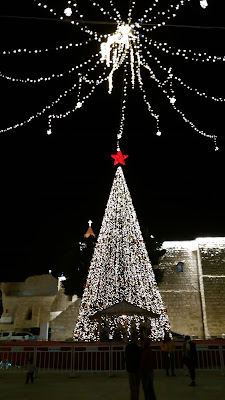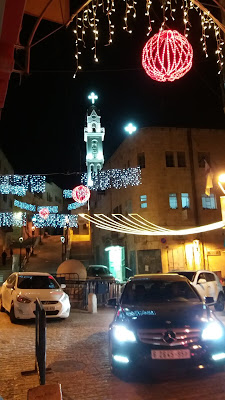– by Alex Jones –
When I was a kid, we celebrated Christmas by opening gifts on morning of the 25th of December. I never questioned this, and it seemed the most natural thing to do considering everyone around me did the same thing and this was marked on our calendars as ‘Christmas Day’. But I later learnt that for many Christians, families have their biggest celebration on the 24th of December. I was even more surprised to learn later that depending on which branch of Christianity is most prevalent where you are, you may celebrate on January 6, 7, 18 or 19!
 |
Christmas lights and the Nativity Church |
Yesterday in Bethlehem was the Orthodox celebration of Christmas. The Patriarch of the Greek Orthodox Church makes a journey from the Mar Elias Monastery in Jerusalem – thought to be near the spot where a heavily pregnant Mary rested on her way to Bethlehem – towards the Nativity Church in Manger Square – thought to be the spot where she then gave birth.
Incidentally, he crosses the West Bank barrier through a special gate, build expressly for this purpose, and his procession recently has been greeted much less warmly by Palestinian locals. The church has recently been ‘forced to liquidate some assets’. Read: selling a large quantity of land in prime strategic locations to Jewish settlers. Much of the land was originally sold by Palestinians to the church assuming they would keep it safe and a lot of locals feel betrayed that it is now in the hands of settlement movements considered illegal by the international community.
But why do we celebrate Christmas on this date at all? Nowhere in the Bible does it say that Jesus was born on this date, or even that he was born in winter. In fact, it seems unlikely considering the shepherds were sleeping in the fields while their flocks grazed under the chilly December skies. You can visit the Shepherds’ Fields church on our Bethlehem tour which is said to have been built on the spot where this happened and anyone who has been there with us recently knows it’s not an ideal place to camp out in mid-winter!
One theory is that when Constantine converted to Christianity in 313, his subjects throughout the Roman Empire were expected to follow suit. It must have been hard to take away their beloved Pagan shrines, festivals and traditions and so many of the Christian equivalents were adapted and put on top. One of the largest festivals was Saturnalia, which honoured the god Saturn. It was held on 17 December of the Julian calendar and later expanded with festivities through to 23 December. One theory is that Christmas was celebrated on the evening of the 24th or the 25th to compensate for banning Saturnalia.
Another theory suggests an astrological metaphor. The night of the 21st-22nd is the shortest of the year, known as the winter solstice. For two more nights the sun rises only an imperceptible amount to an ancient astronomer, and the third night, from the 24thto the 25th, is the first when many believed it rose again. This is of course symbolic of Christ’s crucifixion, death and resurrection three days later and may have been why the 25th was chosen as the date to celebrate Christmas.
But this doesn’t account for the date discrepancies between the various Churches. It is true that many Orthodox countries like Russia used the Julian, rather than the Gregorian calendar, which are about a week apart from one another. But even if the name of the day is different, an event in the sky still takes place on the same moment everywhere on the planet!
 |
Assyrian Orthodox Church in Bethlehem |
The best explanation comes from a tradition that says that Christ’s death occurred on the same day of the year as his miraculous conception. If we work backwards from mid-April the year he was crucified, and assume that even though he had no human father he did nevertheless spend 9 months in the womb, his date of birth would be approximately 33 years earlier, on December 25. The Orthodox Easter is about a week later than the Latin Easter, so the Christmas date shifts too.
Whatever the reason, it does give open-minded pilgrims, and cities like Bethlehem, an excuse to celebrate one event for nearly a month! If you missed the first two Christmases in Bethlehem, all is not lost, because the Armenian Christmas in the Holy Land rounds the festivities out, on January 18. And of course, Bethlehem is a great city to visit year-round, Christmas time or not.

Comment (0)